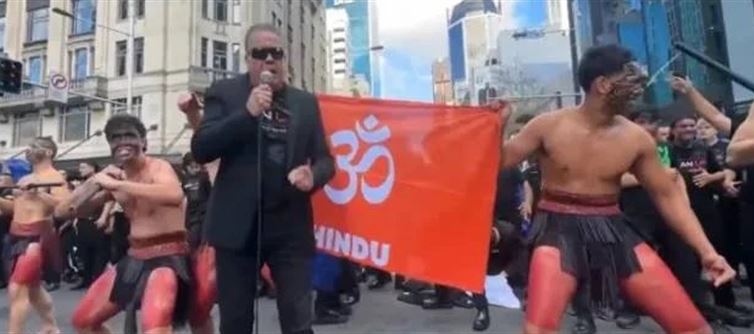
Targeted groups include immigrants, Sikhs, Muslims, Hindus, and Palestinians. Destiny Church is an organization led by religious leader Brian Tamaki. These demonstrators have burned the flags of Muslims, Buddhists, Hindus, and Palestinians in provocative ways. This has damaged the multicultural reputation of New Zealand.
With an approximate population of 53 lakh, new zealand has long welcomed immigration. Following the coronavirus outbreak, immigration rose quickly. The government made an effort to give talented immigrants—like teachers and doctors—priority, but locals believed that foreigners were stealing their jobs. people in the impacted neighborhoods felt angry and insecure as a result of this circumstance.
The throng in Central auckland chanted, "Faith, flag, family," as anti-immigration demonstrators assembled, led by Brian Tamaki of Destiny Church. Flags representing Islam, Buddhism, Hinduism, and palestine were torn, trampled underfoot, and set on fire by the protesters, many of whom performed the haka. These acts of devastation were followed by traditional war dances.
Some sections of the new zealand populace were becoming increasingly uneasy about the nation's shifting immigration situation, which was reflected in the protest. Tamaki, a notoriously controversial and radical religious figure, made his intentions apparent. "The spread of non-Christian religions is now out of control," he stated. He further stated that "Any type of immigration without assimilation is invasion."
The nation's leaders responded quickly and firmly. Tamaki's opinions were deemed "un-Kiwi" by acting prime minister David Seymour.
He further stated that "New Zealand’s great strength is that we are a nation of pioneers who moved here to give their children a better tomorrow."
The demonstration and its use of religious customs were denounced by New Zealand's police minister Mark Mitchell, who called it "vile rhetoric and behaviour" that had no place in the nation.
However, there is a greater anti-immigration feeling in New Zealand. This is the reason.
WHY AN IMMIGRATION PROBLEM IN NEW ZEALAND?
There was more to the auckland eruption than meets the eye.
Since late 2022, migration to new zealand, a nation of just over 5.3 million people, has dramatically increased.
The government has attempted to give preference to native-born people for positions where there is no shortage, even as it has emphasized the need for qualified immigrants, especially in fields like education.
Immigration minister Erica Stanford stated, "The government is focused on attracting and retaining highly skilled migrants such as secondary teachers, where there is a skill shortage." "At the same time, we need to ensure that New Zealanders are put to the front of the line for jobs where there are no skills shortages."
This worry has been repeated by prime minister Christopher Luxon, the head of the conservative National Party. Luxon stated that the nation's high net migration rates did not "feel sustainable at all," according to a BBC report, in an interview with Radio new zealand in December.
Public annoyance has been exacerbated by New Zealand's housing crisis and record migration. The rhetoric against immigration is also a part of a global upsurge in anti-immigration protests.




 click and follow Indiaherald WhatsApp channel
click and follow Indiaherald WhatsApp channel